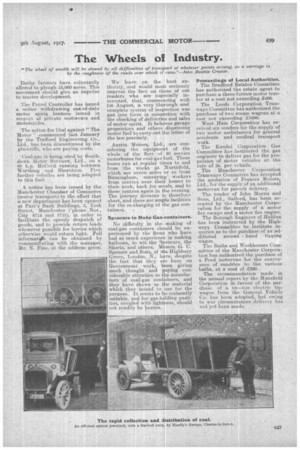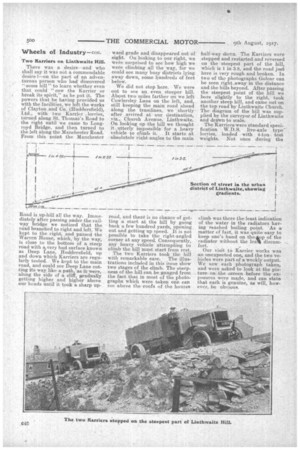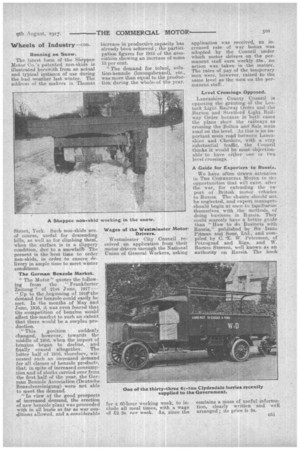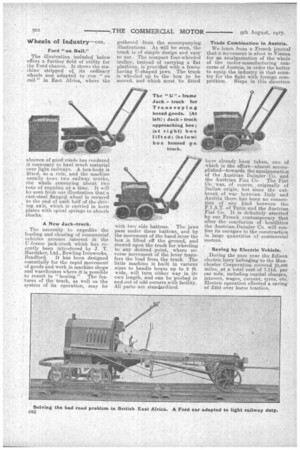The Wheels of Industry.
Page 15

Page 16

Page 17

Page 18

If you've noticed an error in this article please click here to report it so we can fix it.
"The wheel of wealth will be slowed by all difficulties of transport at whatever points arisin,g, as a carriage is
by the roughness of the roads over which zt runs."--John Beattie Crozier.
Derby farmers have voluntarily offered, to plough 10,900 acres. This movement should give an impetus to tractor development.
The Petrol Controller has issued a notice withdrawing out-of-date • motor spirit licences issued in respect of private motorcars and motorcycles.
The action lor libel against "The Motor" commenced last January by the Trafford .Engineering .Ltd., has been discontinued by the plaintiffs, who are paying costs.
Coal-gas is being used by South-. down Motor Services, -Ltd., on a 40 h.p. McCord running between. Worthing and Shoreham. Five further vehicles are being adapted
to this fuel. .
A notice has been issued by the Manchester Cha.rnber of Commerce (motor transport) to the effect that a new department has been opened at Parr's Bank Buildings, 3, York Street, Manchester ('phone Nos., City 8714 and 8715), in order to facilitate the speedy despatch of goods, and to proaidt return loads whenever possible for lorries which otherwise would return light. Full informatin can be obtained by eommunitating with the manager, Mr. N. Fine, at the address given.
We . learn on the best authority, and would most seriously impress the fact on those of our readers who are especially interested, that, commencing with 1st August, a very thorough and complete system of inspection was put into force in connection with the checking of deliveries and sales of motor spirit. It behoves garage proprietors and others dispensing motor fuel to carry out the letter of the law precisely. .
Austin Motors, Ltd., are considering the equipment of the whole of the fleet of 30 service motorbuses for coal-gas fuel. These buses run at regular times to and from the works at Northfield, which are seven miles or so from Birmingham, conveying'. workers from centres near their homes to their work, back for meals, and to these centres again in the evening. The j urney distance is therefore short, and there are ample facilities for te re-charging of the gas containers.
Spencers to Make Gas-containers.
No difficulty in the making of coal-gas containers should be experienced by the firms who have had so much experience in making balloOns, to wit the Spencers, the Shorts, and others. Messrs. G. C. Spencer and Sons of 38a-Highbury Grove, London, -,F.si., have. despite the fact that they are busy on Government work', been giving much thought and paying considerable attention to the manufacture of coal-gas containers, and they have shown us the material which they intend to use for the .purpose. It seems to be eminently suitable, and for gas-holding qualities, collided with lightness, should not readily be beaten. Proceedings of Local Authorities, The Bradford Estates Committee has authorized the estate agent to purchase a three-furrow motor tractor at a cost not exceeding £400.
The Leeds Corporation Tramways Committee has authorized the purchase of two steam wagons at a cost not exceeding .21600.
West Ham Corporation has received six tenders for the supply of two motor ambulances for general accidents and medical transport work.
The Kendal Corporation Gas Committee has instructed the gas engineer to deliver gas for the propulsion of niotor vehicles at the rate of 3s. per vehicle.
The Manchester Corporation Tramways Committee has aneepted the quotation of Frances Motors, Ltd., for the supply of an additional motorvan for parcels delivery.
The tender of John Morris and Sons, Ltd., Salford, has been accepted by the Manchester Corporation for the supply of a motor fire escape. and a motor fire engine.
The Borough Engineer of Halifax has been instructed by the ughways Committee to institute inquiries as to the purchase of an additional second hand tipping wagon.
The Baths and Workhouses Committee of the Manchester Corporation has authorized the purchase of a Ford motorvan for the conveyance of sundries to the various baths, at a cost of £220.
The recommendation made in the annual report by the Mansfield Corporation in favour of the purchase of a two-ton .electric tipwagon from the General Vehicle Co. has been adopted, but owing to war circumstances delivery has not yet been made.
Two Karriers on Linthwaite Hill.
There was a desire—and who shall say it was not a commendable desire 2—on the part of an adventurous person who had discovered
some hill" to learn whether even that could "cow the Karrier or break its spirit," as he put it. The powers that be having provided us with the facilities, we left the works of Clayton and Co. (Huddersfield), Ltd., with two Karrier
turned along St. Thomas's Road to the right until we came to Longroycl Bridge, and then turned to the left along the Manchester Road. From this point the Manchester Road is _up-hill all the way. Immediately after passing under the railway bridge we noticed that the rciad branched to right and left. We kept to the right, and passed the Warren House, which, by the way, is close to the bottom of a steep road with a,very bad surface known as Deep Lane, Huddersfield, up and down which Karriers are regularly tested. We kept to the main road, and could see Deep Lane cutting its way like a path, 'as it were, along the side of a cliff, gradually getting higher and higher above our heads until it took a sharp up ward grade and disappeared out of sight. On looking to our right, we were surprised to see how high we were climbing all the way, for we could see many busy districts lying away down, some hundreds of feet below.
We did not stop here. We were out to see an even steeper hill. About two miles farther on we left Cowlersley Lane on the left, and, still keeping the main road ahead along the tramlines, we shortly after arrived at our destination, viz.' Church Avenue, Linthwaite. On looking. up the hill we thought it utterly impossible for a heavy vehicle to climb it. It starts at absolutely right-angles to the main
road, and there is no chance of getting a start at the hill by going back a few hundred yards, opening . out and getting up speed. It is not Possible to take the right-angled corner at any speed. Consequently, any heavy vehicle attempting to climb the hill must start from rest.
The two Karriers took the hill with remarkable ease. The illustrations included in this issue show two stages of the climb. The steepness of the hill can be gauged. from the fact that in most of the, photographs which were taken on can sse above the roofs of the housss half-way down. The Karriers were stopped and restarted and reversed on the steepest part of the hill, which is 1 in 3.8, and the road just here is very rough and broken. In two of the photographs Golear can be seen right,away in the distance and the hills beyond. After passing the steepest point of the hill we bore slightly to the right, took another steep hill, and came out on the top road by Linthwaite Church. The diagram of the hill was supplied by the surveyor of Linthwaite and drawn to scale.
The Karriers were standard specification W.D.S. live-axle type' lorries, loaded with 4-ton test weights. Not once during the climb was there the least indication of the water in the radiators having reached boiling point. As amatter of fact, it was quite easy to keep one's hand on the Aop of the radiator without the lea discomfort.
Our visit to Karrier works was an unexpected one, and the two vehicles were part of a weekly output. We saw each photograph taken, and were asked to look at th.e.picture on the screen before -the exposures were made, and can state that each is genuine, as will, however, be obvious. Running on Snow.
The latest form of the Sheppee Motor Co.'s patented non-skids is illustrated herewith from an actual and typical instance of use during the bad weather last winter. The address of the makers is Thomas
Street, York. Such non-skids are, of course, useful for descendin hills, as well as for climbing them, when the surface is in a slippery condition, due to a snowfall The present is the best time to order non-skids, in order to ensure delivery in ample time to meet winter conditions.
The German Benzole Market.
"The Motor" quotes the follow
ing from the " Frankfurter Zeitung " of 21st, June, 1917 :— ",Up to the ,beginning of 1916'.the demand for benzole-could easily be met. In the months of May and June, 1916, it was even feared that the 4competition of benzine would a,ffect the market to such an extent that there would be a surplus production.
"This .position suddenly changed, however, towards the middle of 1916, when the import of benzine began to decline, and finally ceased altogether. The latter half of 1916, therefore, witnessed such an increased demand for all classes of benzole products, that, in spite of increased consumption and of stocks carried over from the first half of the year, the German Benzole Association (Deutsche Benzolvereinigung) were not able, to meet the demand.
"In view of the good prospects of increased demand, the erection of new benzole plant was proceeded with in all haste as far as war conditions allowed, and a considerable increase in productive capacity has already been achieved; the participation figures for 1916 of the association showing an increase of some 13 per cent.
" The demand foe toluol, solution-benzole (losungsbenzol), etc., was more than equal to the production during the whole‘of the year.
Wages of the Westminster Motor, Drivers.
Westminster City Council received an application from their motor drivers through the National Union of General Workers, asking
For a 60-hour working week, to include all meal times, with a wage of 22 2s. ner week. As, since the application was received, an increased rateof war bonus was adopted by the Council under which motor drivers on the permanent staff earn weekly 45s., no action was taken in the matter. The rates of pay of the temporary men were, however, raised to the same level as the men on the permanent staff.
Level Crossings Opposed.
Lancashire County Council is opposing the granting of the Los'bock Light Railway Order and the Barton and Stretford Light Railway Order because in both cases the plans show the railways as crossing the 'Bolton and Sale main road on the level. As this is an important main road between Lancashire and Cheshire, with a very substantial traffic, the Council thinks it. would be most objectionable to have either one or two level crossings.
A Guide for Exporters to Russia.
We have often drawn attention in THE COMMERCIAL MOTOR IO th opportunities that will exist, after the war, for extending the export of British motor vehicles to Russia. The chance should not be neglected, and export managers should begin at once to fapiliarize themselves with the methods of doing business in Russia. They could scarcely have a better guide than "How to do Business with Russia," published by Sir Isaac Pitman and Sons Ltd.' . and com piled, by C. 'E. Petersson, of Petropad and Riga, and W.
Barnes Ste ' veni well known as an authority on Russia. The book contains a mass of useful information, clearly written and well arranged ;_ its price is 5s. Ford "on Rail."
The illustration included below offers a further field of utility for the Ford chassis, it shows the machine stripped of its ordinary wheels and adapted to run " on rail " in East Africa, where the absence of good roads has rendered it necessary to haul much material over light railways. A box-body is fitted, as a rule, and the machine usually tows two railway trucks, the whole conveying about. two tons of supplies at a time. It will be, seen from our illustration that a east-steel flanged wheel is secured to the end of each half of the driving axle, which is carried in horn plates with spiral springs to absorb shocks.
A New Jack-truck.
The necessity to expedite the loading and clearing of commercial vehicles arouses interest in the U-frame jack-truck which has recently been introduced by J. T. Hardaker, Ltd., Bowling Ironworks, Bradford. It has been designed essentially for the rapid movement of goods and work in machine shops and warehouses where it is possible to resort to "boxing." The features of the truck, as well as the system of its operation, may be gathered from the accompanying illustrations. As will be seen, the truck is of simple design and easy to use. The compact four-wheeled trolley, instead of carrying a flat platform, is provided with a frame . having U-shaped jaws. The truck is Wheeled up to the box to be moved, and which must be fitted
with two side battens. The jaws pass under these battens, and by the movement of the hand lever the box is lifted off the ground, and stowed upon the truck for wheeling to any desired point, where reverse movement of the lever transfers the load from the truck. The little machine is built in various sizes to handle boxes up to.2 ft. wide, will turn either way in its own length, and can be Pushed in and out of odd corners with facility. All parts are standardized.
Trade Combination in Austria.
We learn from a French journal that a movement is afoot in Vienna for an amalgamation of the whole of the motor-manufacturing concerns of Austria, in order the better to equip the industry in that country for the fight with foreign com
petition. Steps in this direction have already been taken, one of which is the effort—almost accomplished—towards the amalgamation of the Austrian Daimler Co. and the Austrian Fiat Co. The Fiat Co. was, of course, originally of Italian origin, but since the outbreak of war between Italy and Austria there has been no connection of any kind between the
-of Turin and the Austrian Fiat Co. It is definitely asserted by our French contemporary that after the conclusion of hostilities the Austrian-Daimler -Co. will confine its energies to the construction in large quantities of commercial motors.
Saving by Electric Vehicle.
.During the past year the Edison electric lorry belonging to the Manchester Corporation covered 10,486 miles, at a total cost of 71Id. per car mile, including capital charges, interest, wages., current, tyres, etc. Electric operation effected a saving of £255 over horse traction.






















